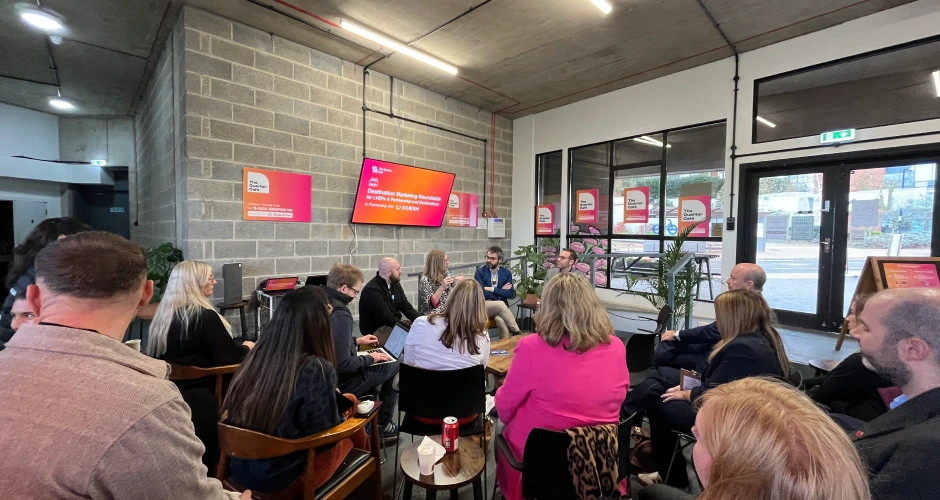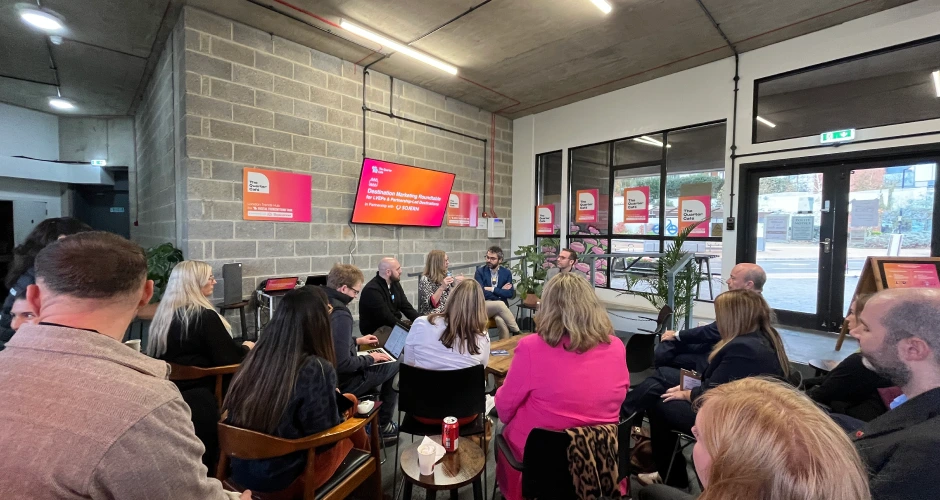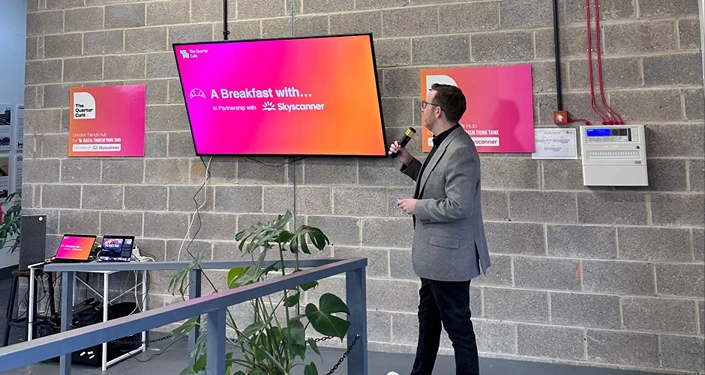In the closing episode of our "Tour Tech: Your 5 Weekly Takeaways to Tourism Success" podcast series, part of the EU-funded Tourbit project, we reflect on the transformative potential of digitalisation for tourism SMEs and the key learnings and takeaways we've heard throughout the series. In this episode, Sandra De Puig, EU Project Manager, Catalan Tourist Board, Véronique Renard, Manager of the hospitality.brussels Cluster, hub.brussels, Asta Kristin Sigurjonsdottir, Managing Director, Iceland Tourism Cluster, and Eija Raasakka, Senior Specialist RDI, Lapland University of Applied Sciences, highlight the significance of collaboration and partnerships in improving competitiveness.
The Tourbit project aims to empower Europe's tourism SMEs to embrace digital transformation. Recognising the potential of digital technologies to enhance competitiveness and customer experiences, the project focuses on fostering the skills and knowledge needed for SMEs to thrive in the digital age. While a common pitfall in digitalisation support programmes is that industry experts get caught up in presenting big trends and opportunities that overwhelm small businesses, Tourbit successfully avoids this by focusing on practical, down-to-earth solutions. By directly addressing the small, achievable steps that can make a big difference, Tourbit not only helps businesses take action but also begins to shift their mindsets towards digitalisation. This highlights the importance of tailoring support programmes to the specific needs and understanding of the target audience.
Tourbit delivers its support through a three-pillar framework, designed to equip SMEs with a comprehensive digitalisation roadmap. The first pillar focuses on learning to build a strong foundation of digital literacy among participating businesses. This pillar includes self-assessment tools to help SMEs evaluate their current digital maturity level. Additionally, the project offers training programmes and workshops covering a wide range of topics, such as data analytics, cyber security and leveraging AI and other emerging technologies. By equipping SMEs with a baseline understanding of digital technologies and their applications within the tourism industry, this pillar empowers businesses to make informed decisions as they embark on their digital transformation journeys.
The second pillar aims to foster collaboration and knowledge sharing between SMEs, digital service providers and industry experts. The project facilitates networking events and workshops that bring together these various stakeholders. This includes a matchathon, where teams composed of SMEs and tech developers collaborate to create innovative digital solutions for the tourism industry. By fostering collaboration and the exchange of ideas, SMEs can identify the most appropriate digital solutions for their specific needs and connect with the service providers best suited to implement them.
The third pillar relates to testing, providing SMEs with financial and technical support to pilot and implement their chosen digital solutions. The project provides grants to participating businesses to cover a portion of the costs associated with implementing new technologies. Additionally, the project partners offer mentorship and guidance throughout the implementation process, ensuring that SMEs can overcome any technical challenges and achieve successful integration of new technologies into their operations. By providing this essential support, SMEs are enabled to translate their digitalisation plans into tangible results.
Supportive Ecosystem Empowers SMEs
The Tour Tech podcast discussions highlighted the challenges faced by SMEs on their digitalisation paths. A significant hurdle for many businesses was the lack of internal resources and expertise to implement complex digital solutions and develop a clear innovation roadmap.
The project helps SMEs overcome the intimidation of starting their digital transformation journey by breaking it down into smaller, achievable steps. Some SMEs focus on ambitious and conceptual ideas that leverage technology for automation and personalisation, where expert consultants work alongside the SMEs to translate their big ideas into practical solutions through experimentation with technology. The project emphasises that successful digitalisation for some businesses may not involve readily available templates, but rather a creative exploration of how technology can fulfil their unique visions.
The roadmap outlines a phased approach to digitalisation. It suggests a set of technologies that deliver quick wins and build confidence within the SME. As the SME gains experience and comfort, the roadmap could be expanded to incorporate more advanced digital solutions. This tailored approach ensures that SMEs aren't overwhelmed by the plethora of technological options and it empowers them to take ownership of their digital transformation journey.
The Tourbit project provides participating SMEs with a strong support system that is tailored to their specific needs. Project partners work closely with each SME to understand their current digital landscape, their business goals and their comfort level with technology. This in-depth understanding allows the partners to recommend appropriate digital solutions and create a customised innovation roadmap. As such, Tourbit emphasises the need for technology providers to adapt their solutions to the specific needs of SMEs, rather than expecting SMEs to conform to pre-existing technology. Despite the extra effort required from digital service providers, they not only support the immediate transformation of SMEs but also open doors to future scalability. This collaborative approach creates a win-win situation for both SMEs and technology providers.
Learning from Each Other's Journeys
By bringing together businesses from various regions and with diverse digital experiences, the project fosters a collaborative environment where participants can learn from each other's successes and challenges. This knowledge exchange proved invaluable for SMEs, as they gained insights into a wide range of digital solutions and strategies employed by their peers.
A common discussion topic was how technology needs to be woven into business operations and how to train staff to effectively utilise new digital tools. For example, concerns about AI replacing human jobs are countered by the real-life application of the technology within SMEs. While this innovative technology proves valuable for tourism companies, the human touch remains crucial for customer connection. This showcases how technology and human intervention work best when used in tandem, not as replacements for each other. As such, learning from other businesses is crucial to ensure the seamless integration of technology into management processes.
Entrepreneurs who had already implemented digital solutions were able to share their experiences and guide others along similar transformation journeys. SMEs grappling with the complexities of managing online bookings or implementing Customer Relationship Management systems, for example, could learn from the experiences of those who had successfully applied these technologies. This sense of community fostered by Tourbit empowers SMEs to feel less isolated and more confident in navigating their digital transformation journeys.
Unlocking Potential Through Data Management
Data management emerged as a critical theme throughout the podcast series. While many SMEs recognise the value of data-driven approaches, they often lack the skills and tools to effectively analyse data and translate it into actionable strategies. The project reveals that SMEs frequently have data scattered across various systems, making it difficult to glean meaningful insights.
Offering SMEs training on data analysis tools and helping them identify Key Performance Indicators to track is essential. By empowering SMEs to unlock the potential of their data, the project positions them to optimise marketing campaigns, improve customer experiences and ultimately drive business growth.
Interestingly, the project's impact extended far beyond the initial investment. While the financial support and mentorship provided a springboard, SMEs actively engaged in the process, often exceeding minimum requirements. This dedication resulted in a significant economic ripple effect. Businesses invested additional resources, demonstrating a strong return on investment and a commitment to long-term digital transformation. This resulted in increased spending on digital services and technologies, further stimulating the digital ecosystem within the participating regions.
The Tourbit project highlights the need for organisations supporting tourism businesses to identify an enabling point to best focus future support efforts. The pan-European collaboration showcases the wealth of expertise available across the continent, demonstrating a willingness to share knowledge that can benefit all participants.
Key Takeaways
Tourbit serves as a valuable learning experience for designing future support programmes that can empower even more businesses within the tourism ecosystem, especially as technological innovation is inextricably linked with sustainability. Financial constraints and a perceived lack of necessity can be significant hurdles for the digital transformation of SMEs. However, Tourbit demonstrates the power of experimentation, where once businesses had the opportunity to try new approaches, they were often convinced of the value. This highlights the importance of providing not just financial resources, but also the tools and encouragement to foster long-term digital transformation. Such a personalised and supportive approach allows tourism businesses to embrace technology not as a threat, but as a tool that can enhance their operations, improve efficiency and ultimately make their work more enjoyable.
Tourbit showcases how technological solutions typically associated with large organisations can be successfully implemented by small businesses. This demonstrates that innovative technology is not limited to big players. Empowering SMEs to adopt advanced technology also stimulates the tech sector.
While some service providers initially lack a deep understanding of the tourism industry's specific challenges, they learn and adapt through collaboration with SMEs. This highlights a two-way learning curve: SMEs benefit from the service providers' expertise, while the service providers gain valuable industry knowledge. Tourism's unique challenges, such as seasonality and the predominance of small family-run businesses, may require different approaches, but the industry possesses significant potential for creativity. The Tourbit project underscores the importance of service providers understanding the tourism industry to develop technology that creates engaging experiences for visitors while simultaneously strengthening the businesses themselves.
Here are the five key takeaways:
- The success of digital transformation for SMEs lies in focusing on seemingly mundane details and leveraging technology to unlock new opportunities and improvements.
- Tourbit's flexible approach focuses on providing a supportive framework rather than strict adherence to requirements, creating a safe space for SMEs to experiment with new digital tools.
- Peer-to-peer learning empowers SMEs to make informed decisions and navigate the complexities of digital transformation.
- Tourbit's diversity across seven European countries underscores the significant impact of cultural and geographic influences on how SMEs develop and implement digital solutions.
- Data empowers SMEs to understand their business performance, with service providers acting as translators, interpreting the data and creating insights that inform intelligent business decisions.
The podcast is part of the Tourbit project, co-funded by the EU's COSME programme, with the support of the Catalan Tourist Board, Barcelona Chamber of Commerce, Paris&Co, Arctur Doo, Hub Brussels, Iceland Tourism Cluster, Lapland University of Applied Sciences and NEST - Tourism Innovation Center.






.svg)
















.webp)
